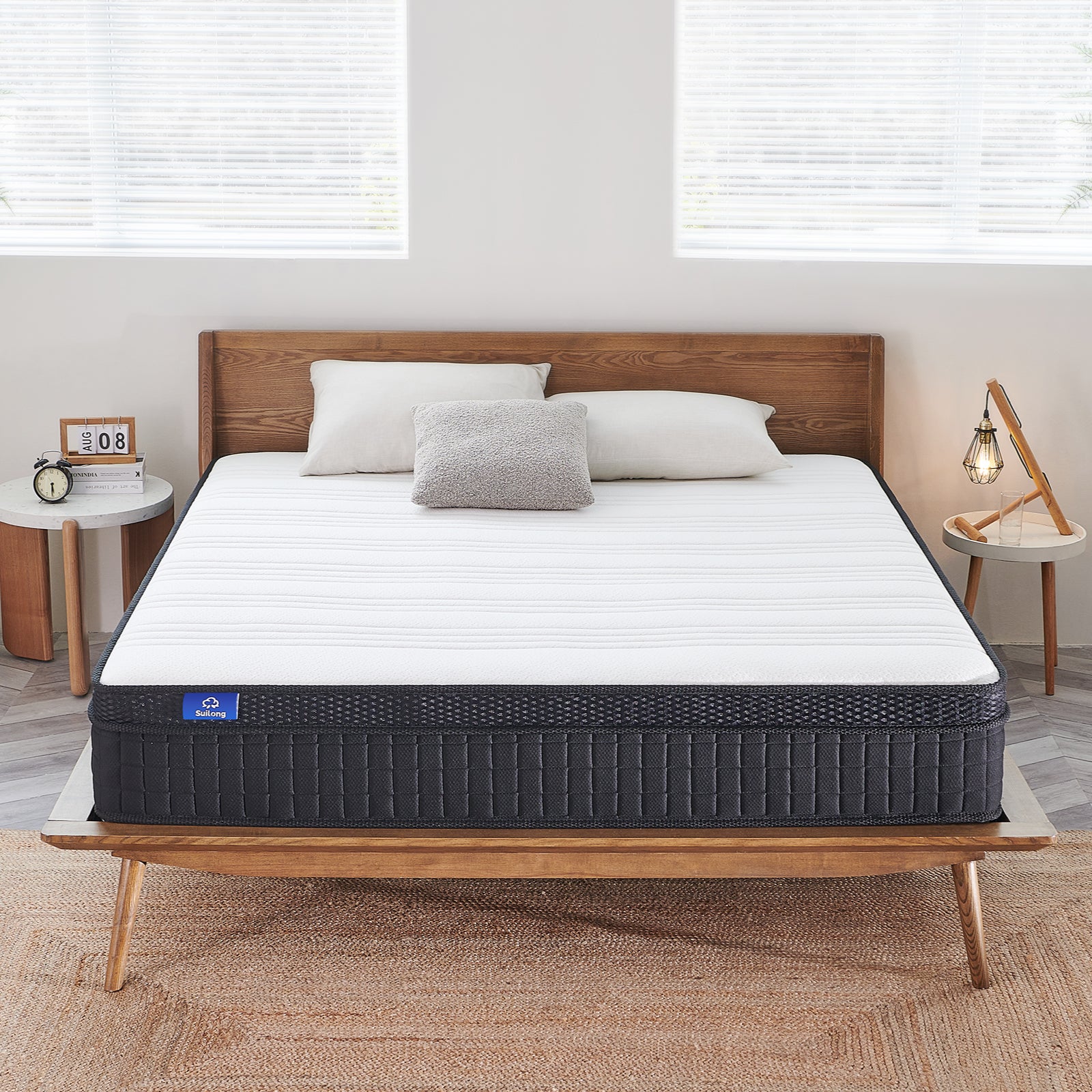Sleeping Hot: Comprehensive Guide to Cool Nights & Best Mattresses

In the dead of night, we all want to enjoy a cosy night's sleep. But sometimes, whether it's a summer night during a heatwave or a blazing hot night, it feels like it's always hot. Why do we feel so hot when we sleep? And what's the science behind it? More importantly, what are the solutions that can help us get out of this predicament? If you are also a hot sleeper, then keep reading and this article will reveal everything to you.
1. Why do we feel hot when we sleep?
The role of the body's metabolism
- Nocturnal metabolism and heat production: The body's metabolism converts food into energy and produces heat, which does not stop at night.
- Sleep and basal metabolic rate: although the basal metabolic rate decreases slightly at night, a certain amount of heat is still produced.
Describe the body's thermoregulatory mechanism at night
- Thermoregulatory Mechanisms: the body has a precise thermoregulatory system involving blood vessels, sweat glands, etc.
- REM vs. non-REM stages: thermoregulation varies during different sleep stages. during REM stage, thermoregulation is weakened and one may feel warm.
Influence of Environmental Factors
- Room temperature: There is a direct correlation between room temperature and skin surface temperature. Too high or too low a temperature can interfere with the body's natural thermoregulation.
- Choice of bedding: The material and thickness of bedding can affect heat dispersion.
Health Problems
- Certain health conditions can lead to increased body temperatures: e.g. infections, chronic inflammation, etc.
- Appropriate diagnosis and solutions: Consult your doctor if necessary, medication or other treatments may be required.

2. Explore the science of sleep heat
How the body's thermoregulatory system works
- Hypothalamic regulation: the hypothalamus is the part of the brain that controls temperature by adjusting blood flow and sweat.
- Failure of thermoregulation: In some cases, such as certain diseases or medications, the regulatory mechanism may fail.
How to work at night
- Body temperature drops at night: Body temperature usually drops at night to conserve energy.
- Thermoregulation in different stages
- Deep sleep stage: In the deep sleep stage, body temperature is at its lowest and people are least likely to feel hot.
- REM sleep stage: REM stage where regulatory mechanisms are suspended and one may feel warm.
Relationship between sleep and body temperature
Falling asleep and body temperature drop: people's body temperature begins to drop as they fall asleep.
Research and Discoveries
Scientific studies: Many studies have confirmed the link between temperature and sleep quality.
Individual differences
Different people may react differently to temperature: age, gender, health condition, etc. may affect the sensation.
3. How to sleep when it's hot + cooling tips
Adjust the environment
Optimise the bedroom temperature: the bedroom temperature can be adjusted by air conditioning, fans, etc. Ventilation is also important.
Choose the right bedding: Breathable bedding helps heat to escape.
Change your habits
Time and manner of bathing: Bathing in warm water can help the body relax and reduce body heat before falling asleep.
Use of technological products
Fans, air-conditioners, etc.: Modern technological products can precisely control the temperature and help you sleep.

4. The best mattress for hot sleepers
Choice of mattress type and material
Sleeping temperature depends on a number of factors, one of which is the material of the mattress. Various materials have their own unique breathability and ability to dissipate heat.
- Latex mattresses: latex is naturally resilient and very breathable. It allows air to flow freely inside the mattress, thus helping to dissipate heat.
- Memory foam mattresses: Traditional memory foam can be slightly hot, but modern technology allows for the manufacture of memory foam with a gel layer or breathable holes, which greatly improves the ability to dissipate heat.
- Vortex sprung mattresses: these mattresses have many small holes which aid air circulation and heat dissipation.
How to choose the right mattress
In order to find the best mattress for you, you first need to understand your needs.
- Know your body temperature: everyone has their own temperature preference and body temperature. Understanding how your body temperature changes during the night is crucial to choosing a mattress.
- Consider the thickness of your mattress: a thicker mattress may store more heat. If you are a hot sleeper, then you may want to consider a thinner mattress.
- Try it out and test it: Head to a brick-and-mortar shop to try it out and test it out for yourself. A mattress that feels comfortable and doesn't feel too hot is what you need.
Material versus temperature
Different mattress materials have a direct relationship with temperature.
- Combination of Gel and Memory Foam: Gel helps to dissipate heat and in combination with memory foam can provide a comfortable sleep experience for hot sleepers.
- Advantages of natural latex: Latex is natural and organic, so it naturally breathes and stays cool.
Recommended Mattress Products
To help hot sleepers, some brands have developed products specifically for them.
Suilong's Galaxy Memory Foam range: this product combines the benefits of gel and memory foam and is designed for hot sleepers to ensure you stay cool all night.

5. Sleep disorders and solutions in hot weather
In hot weather, many people often suffer from sleep disorders. Why is this so? Let's delve deeper.
Common sleep disorders
- Difficulty in regulating body temperature: high temperatures make it difficult for the body to achieve the desired drop in body temperature, which is crucial for falling asleep.
- Excessive sweating: excessive sweating at night may lead to discomfort, which can lead to frequent awakenings.
- Excessive dreams or nightmares: the heat may increase REM sleep, which is the most active stage of our dreams.
Impact on health
Sleep quality directly affects our mood, memory and immune system. Constant sleep deprivation increases the risk of disease.
Scientific solutions
- Adjust the indoor environment: use air-conditioning or fans to ensure the bedroom stays cool.
- Consider bedding: Choose breathable cotton sheets and pillows and avoid heavy duvets.
- Limit daytime caffeine intake: Caffeine may make it harder for you to fall asleep. Try to stop your caffeine intake by 3pm.
- Try deep relaxation techniques: such as meditation, deep breathing and progressive muscle relaxation to help calm the body and brain.
- Avoid heavy, spicy and greasy foods: Choose light foods for dinner to avoid causing digestive discomfort and raising your body temperature.
Hot sleeping conditions can be caused by a number of things, from the body's natural metabolism to our choice of bedding. But luckily, there are now a variety of methods and products, such as Suilong's Galaxy Memory Foam range of mattresses, that can help us combat this problem. Hopefully, with this article, you've found the right sleep solution for you, and you'll be able to stay away from the heat and enjoy sweet dreams from now on.
FAQ
Q: What does it mean when you sleep really hot?
A: Sleeping hot can be attributed to several factors. It may be related to the body's natural thermoregulation process, where the body temperature tends to rise and fall throughout the night. External factors like room temperature, bedding materials, and pajama choice can also play a significant role. In some cases, medical conditions or medications might cause increased body heat during sleep.
Q: How do I stop overheating in my sleep?
A: To prevent overheating during sleep:
- Maintain a cooler bedroom environment, ideally between 60-67°F (15-19°C).
- Use breathable and moisture-wicking bed linens and pajamas.
- Invest in a mattress with good airflow and cooling properties.
- Stay hydrated but limit caffeine and alcohol intake before bedtime.
- Consider using a fan or air conditioner.
Q: Why is my head so hot when I sleep?
A: The head can feel hot during sleep due to various reasons. Vasodilation, or the widening of blood vessels, can cause heat to be released from the scalp. Another common reason is sweating, especially if one is wearing a head covering or using heavy pillows. Some medical conditions or medications can also lead to an increased sensation of heat in the head.
Q: Why is my boyfriend so hot at night?
A: Men typically have a higher metabolic rate than women, which means they produce more heat. Additionally, hormonal fluctuations, especially testosterone, can influence body temperature. If your boyfriend is physically active, the increased muscle mass can also generate more heat. Lastly, environmental factors like bedding, clothing, and room temperature can also contribute.
Q: Why does my husband's body feel so hot at night?
A: Similar to the reasons mentioned for boyfriends, husbands may feel hotter due to a combination of metabolic rate, muscle mass, hormonal fluctuations, and environmental factors. Certain medical conditions, medications, or even spicy foods consumed before bedtime can elevate body temperature. If the excessive heat is a consistent issue, it may be worth consulting a physician to rule out any underlying medical causes.
-
Posted in
best sleeping position, Buyer's Guide, Lifestyle, Mattress Buying Guide, Mattress thickness, Mattress Tips, Shopping Tips, Sleep Experts, Sleep Tips, the type of mattress
















